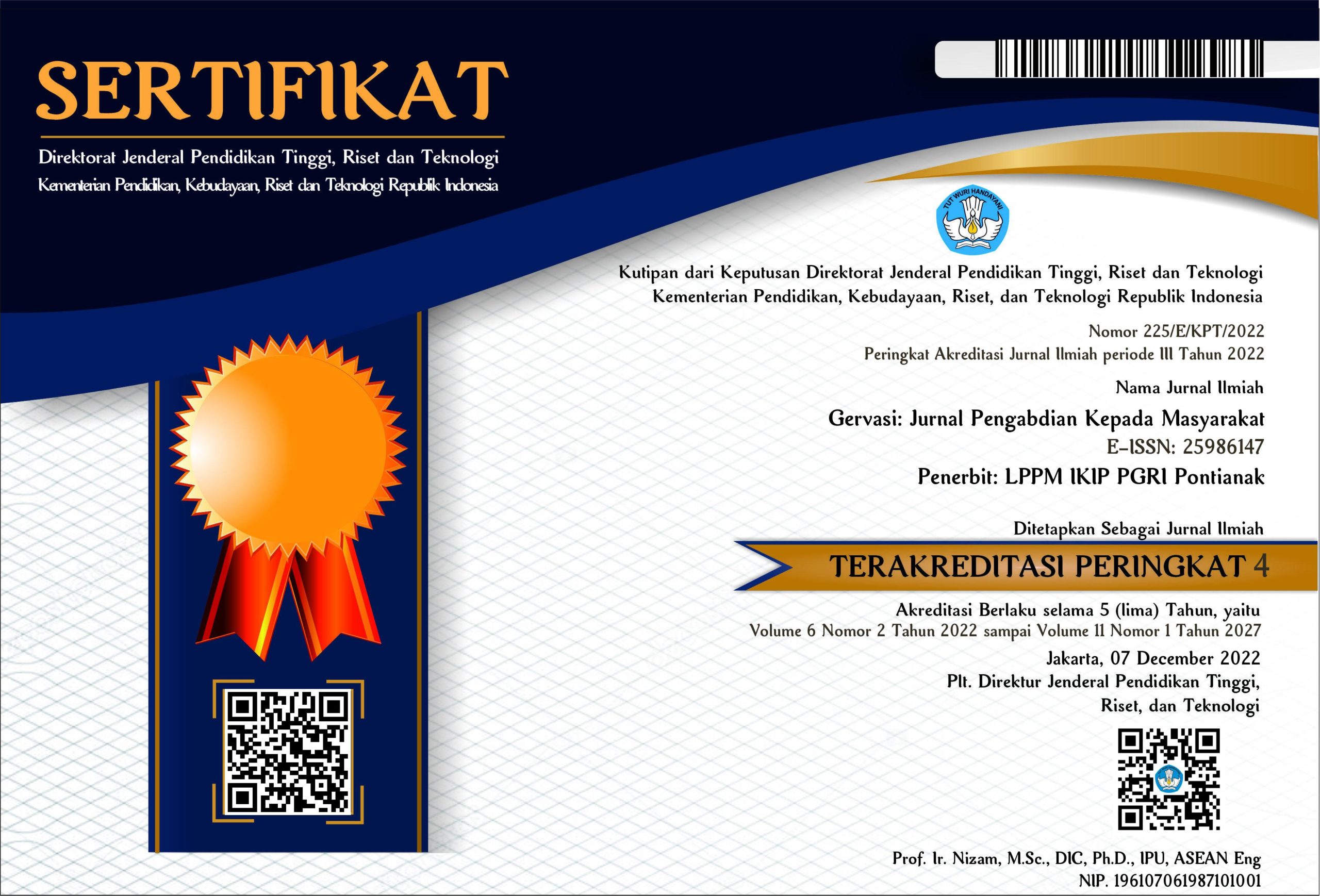Sosialisasi Resiliensi Pada Remaja: You Are Strong Than You Think
DOI:
https://doi.org/10.31571/gervasi.v7i2.5234Keywords:
faktor protektif, kesehatan mental, remaja, resilien, resiliensiAbstract
Masalah kesehatan mental merupakan sesuatu yang menjadi sorotan di kalangan remaja saat ini. Situasi pandemi beberapa tahun belakangan ini, dapat menjadi salah satu faktor yang memberikan dampak bagi kesehatan mental remaja. Pemberian sosialisasi ini ialah bentuk pengabdian kepada masyarakat dengan tujuan mengedukasi para remaja terkait faktor protektif dari resiliensi yang dimiliki remaja, sehingga dapat membantu remaja menjadi pribadi resilien, mampu coping dari faktor risiko yang ada di sekitar mereka serta dapat menurunkan risiko masalah kesehatan mental pada diri remaja. Metode dalam pengabdian masyarakat ini yaitu pendekatan edukatif yang terdiri dari pemberian sosialisasi pada remaja terkait resiliensi dan kegiatan penguatan dan bimbingan pada remaja berupa sharing session. Kegiatan pengabdian ini dilakukan bersama komunitas anak muda dari Kingdom Mission Network. Pelaksanaan pre-test dan posttest sebagai bahan evaluasi dalam mengukur pemahaman remaja terkait resiliensi. Hasil pengabdian masyarakat ini menunjukkan bahwa terdapat peningkatan pemahaman kepada remaja terkait resiliensi, remaja mampu mengidentifikasi faktor-faktor protektif dari resiliensi bagi individu, serta remaja mampu mengidentifikasi karakteristik untuk mendorong mereka menjadi pribadi yang resilien.
Downloads
References
Akbar, Z., & Aisyawati, M. S. (2021). Coping strategy, social support, and psychological distress among university students in jakarta, indonesia during the covid-19 pandemic. Frontiers in Psychology, 12, 694122. https://doi.org/10.3389/fpsyg.2021.694122
Center fo Reproductive Health, University of Queensland, & Johns Bloomberg Hopkins School of Public Health. (2022). Indonesia-national adolescent mental health survey (i-namhs): laporan penelitian. Pusat Kesehatan Reproduksi.
Gee, D. G., Sisk, L. M., Cohodes, E. M., & Bryce, N. V. (2022). Leveraging the science of stress to promote resilience and optimize mental health interventions during adolescence. Nature Communications, 13(1), 5693. https://doi.org/10.1038/s41467-022-33416-4
Grazzani, I., Agliati, A., Cavioni, V., Conte, E., Gandellini, S., Lupica Spagnolo, M., Ornaghi, V., Rossi, F. M., Cefai, C., Bartolo, P., Camilleri, L., & Oriordan, M. R. (2022). Adolescents’ resilience during covid-19 pandemic and its mediating role in the association between sel skills and mental health. Frontiers in Psychology, 13, 801761. https://doi.org/10.3389/fpsyg.2022.801761
Irawan, A. W., Dwisona, D., & Lestari, M. (2020). Psychological impacts of students on online learning during the pandemic covid-19. KONSELI: Jurnal Bimbingan dan Konseling, 07(1), 53–60.
Jones, E. A. K., Mitra, A. K., & Bhuiyan, A. R. (2021). Impact of covid-19 on mental health in adolescents: a systematic review. International Journal of Environmental Research and Public Health, 18(5), 2470. https://doi.org/10.3390/ijerph18052470.
Li, J., Chen, Y., Zhang, J., Lv, M., Välimäki, M., Li, Y., Yang, S., Tao, Y., Ye, B., Tan, C., & Zhang, J. (2020). The Mediating Role of Resilience and Self-Esteem Between Life Events and Coping Styles Among Rural Left-Behind Adolescents in China: A Cross-Sectional Study. Frontiers in Psychiatry, 11.
Masten, A. S. (2014). Global Perspectives on resilience in children and youth—masten—2014—child development—wiley online library, (Online), (tersedia di https://srcd.onlinelibrary.wiley.com/doi/10.1111/cdev.12205).
Mesman, E., Vreeker, A., & Hillegers, M. (2021). Resilience and mental health in children and adolescents: An update of the recent literature and future directions. Current Opinion in Psychiatry, 34(6), 586–592. https://doi.org/10.1097/YCO.0000000000000741
Rahmayanthi, D., Moeliono, M. F., & Kendhawati, L. (2021). Kesehatan mental remaja selama pandemi covid-19. Insight: Jurnal Ilmiah Psikologi, 23(1), 91–101. http://dx.doi.org/10.26486/psikologi.v23i1.1417
Schultz, D. P., & Schultz, S. E. (2017). Theories of personality (eleventh). Cengage Learning.
Theberath, M., Bauer, D., Chen, W., Salinas, M., Mohabbat, A. B., Yang, J., Chon, T. Y., Bauer, B. A., & Wahner-Roedler, D. L. (2022). Effects of COVID-19 pandemic on mental health of children and adolescents: A systematic review of survey studies. SAGE Open Medicine, 10, 205031212210867. https://doi.org/10.1177/20503121221086712
Ungar, M. (2014). Thinker in residence resilience, (Online), (tersedia dihttps://www.ccyp.wa.gov.au/media/1119/report-2014-thinker-in-residence-michael-ungar-resilience-may-2014.pdf).
Viner, R., Russell, S., Saulle, R., Croker, H., Stansfield, C., Packer, J., Nicholls, D., Goddings, A.-L., Bonell, C., Hudson, L., Hope, S., Ward, J., Schwalbe, N., Morgan, A., & Minozzi, S. (2022). School closures during social lockdown and mental health, health behaviors, and well-being among children and adolescents during the first covid-19 wave: a systematic review. JAMA Pediatrics, 176(4), 400. https://doi.org/10.1001/jamapediatrics.2021.5840
World Health Organization. (2021, November 17). Adolescent mental health, (Online), (tersedia di https://www.who.int/news-room/fact-sheets/detail/adolescent-mental-health).
Zimmerman, M. A. (2013). Resiliency theory: a strengths-based approach to research and practice for adolescent health. Health Education & Behavior, 40(4), 381–383. https://doi.org/10.1177/1090198113493782
Downloads
Published
How to Cite
Issue
Section
License
Authors who publish with this journal agree to the following terms:
- Authors retain copyright and grant the journal right of first publication with the work simultaneously licensed under a Creative Commons Attribution License (CC BY-SA 4.0) that allows others to share the work with an acknowledgment of the work's authorship and initial publication in this journal.
- Authors are able to enter into separate, additional contractual arrangements for the non-exclusive distribution of the journal's published version of the work (e.g., post it to an institutional repository or publish it in a book), with an acknowledgment of its initial publication in this journal.
- Authors should sign the copyright transfer agreement when they have approved the final proofs sent by GERVASI prior to the publication.

 Download: 210
Download: 210











